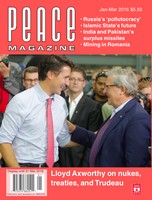
Peace Magazine Jan-Mar 2016, page 22. Some rights reserved.
Search for other articles by René Wadlow here
It is very rare that the Inter – national Committee of the Red Cross makes public criticisms of governments, in part because of the fear that a criticized government would cut off relations and thus end the organization’s efforts to help the wounded, prisoners of war, and others covered by the Red Cross mandate.
Thus the public and high-profile statement by ICRC president Peter Maurer-standing alongside Ban Kimoon in Geneva on 31 October-is an indication of widespread fears that recent attacks against hospitals in Afghanistan and Yemen could weaken, and perhaps even destroy, the prohibitions and restraints in war which are now called “humanitarian law.” As Maurer said,
“If States, other actors in conflict, and the international community as a whole do not act responsibly now, there will be millions more victims. Acting responsibly means redoubling efforts to achieve political solutions and, pending such achievements, ensuring that humanitarian principles and law are respected.
“Hospitals are being attacked, pa – tients, doctors, nurses and humanitarian workers killed. When humanitarian law and principles are disregarded, when humanitarian needs are trumped by political agendas, when access to the wounded and sick is denied, and when security concerns lead to a suspension of operations, people are abandoned, the notion of protection loses its meaning, and humanity is flouted.”
International humanitarian law (the laws of war) prohibits deliberate attacks on civilians not taking a direct part in hostilities and in attacks which do not distinguish between civilians and combatants.
The essential core of humanitarian law is the prohibition on attacking hospitals, medical personnel and the wounded unable to continue fighting. These prohibitions go back to the early Geneva Conventions of July 1906 and were then updated in July 1929 in light of the experiences of the First World War. The Geneva Conventions were renegotiated in the light of the experience of the Second World War leading to the Four Geneva Conventions of August 1949. In light of the experiences of the wars in Nigeria-Biafra and Vietnam, new negotiations were held in Geneva leading to the Two Additional Protocols of 1977. In addition to the Geneva Con – ventions, there is a second avenue of humanitarian law, usually called The Hague Laws, arising from The Hague Conventions of 1899 and 1907 where the emphasis is on banning the use of certain weapons that cause irreversible damage. The ban against cluster munitions is the most recent ban within this “Hague Law” avenue. Unfortunately, none of the weapons bans has an inspection-dispute settlement mechanism except for the much more recent ban on chemical weapons.
The essential character of world law is that it is the broadly-agreed upon rule of moral conduct. Although no significant revision of international humanitarian law is envisaged at the present, there is a constant need to reflect upon what actions are needed to adapt, promote, and implement humanitarian law in the face of the changing realities of armed conflict. Above all we need to look at what we can do when there are violations either by state militaries or by non-state agents such as ISIS in Syria and Iraq.
For the moment, the most direct and open violation of the core elements of humanitarian law-the protection of hospitals, medical personnel, and the wounded-has been by State actors: the USA in Afghanistan and the Saudiled coalition (Bahrain, Egypt, Jordan, Kuwait, Morocco, Qatar, Sudan, and the United Arab Emirates) in Yemen.
There is an obvious lack of political will to deal with violations of humanitarian law. The USA is powerful, and most of the Saudi-led coalition is rich and active buyers of weapons. For the moment, strong protests can come only from non-governmental organizations, though there is little coordinated effort to protest against violence.
The hospitals attacked in both Afghanistan and Yemen were organized by Médecins Sans Frontières (MSF)- the original “French Doctors” created in the aftermath of the Nigeria-Biafra war, when the ICRC did not speak out against the Nigerian policy of starvation as a war weapon for fear of no longer being able to carry out its relief work. The “roving ambassador” of Biafra to Europe was one of my former students who, when he was in Geneva, would stop by to see me and update me on events. Thus I knew the difficulties in getting the media to focus on starvation as a deliberate policy of war and not as unfortunate “collateral damage.”
Thus, we must agree with the remarks of the then President of MSF, Dr James Orbinski, when the organization received the Nobel Peace Prize:
“Silence has long been confused with neutrality, and has been presented as a necessary condition of humanitarian action. From its beginning, MSF was created in opposition to this assumption. We are not sure that words can always save lives, but we know that silence can certainly kill.”
René Wadlow is president and representative to the UN, Geneva, of the Association of World Citizens.

Peace Magazine Jan-Mar 2016, page 22. Some rights reserved.
Search for other articles by René Wadlow here